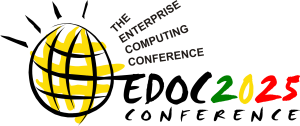CBI 2025 – 27th International Conference on Business Informatics
The CBI conference series encourages a broad understanding of Business Informatics research, and intends to further its many different facets, theoretical foundations and experiential body of knowledge. In doing so, the CBI series has proven to be a fertile ground for research with high impact. It constitutes a hub for multidisciplinary research with contributions from Management Science, Organization Science, Economics, Information Systems, Computer Science, and Artificial Intelligence.
Accordingly, the CBI series of conferences aims to bring together researchers from different fields and disciplines to stimulate discussion, synergy and collaboration. To that end, the CBI conferences use a format that enables in depth discussions among researchers during the conference.
The benefits of such a cross-disciplinary conception are contrasted by a challenge: Authors who submit a paper take the opportunity to be assessed by standards that are complementary to those they are used to in their own research communities. The conference organization accounts for this challenge by involving renowned program committee members from different fields and disciplines.
Topics
Topics include but are not restricted to:
- Opportunities and challenges of emerging AI approaches in the business informatics domain
- Enterprise Modeling, Engineering and Architecture
- Data and AI Applications for Business
- Business Process Management lifecycle
- Information Systems Engineering, Management and Governance
- Business Innovation and Digital Transformation
- Digital Platforms
- Digital Transfomation Initiatives
- Information Systems Risk, Security, and Resilience
- Digital Technologies and the Future of Work
- Egovernment and Digital Society
Submissions
CBI Research Papers are restricted to 10 pages and must follow the IEEE 2-column template and the A4 format. Template files for MS Word and Latex are available here.
Publication
Only papers accepted and presented during the conference will be published in the proceedings.
Each accepted paper must have one of its authors registered by the author registration deadline (see important dates).
The organizers reserve the right to remove a paper from the proceedings if no author is registered by then.
CBI is not sponsored by the IEEE, but has an agreement with the IEEE Computer Society’s Conference Publishing Services (CPS) to handle production of conference proceedings content. Accepted papers will be submitted for possible inclusion into IEEE Xplore and will be subject to review based on meeting IEEE scope and quality requirements. If it is found that these requirements are not meet, content may not appear in IEEE Xplore.
CBI Proceedings Chair: David Aveiro, Universidade da Madeira, Portugal
Organization
- CBI Program Committee Chairs
- Sérgio Guerreiro, INESC-ID, IST, Universidade de Lisboa, Portugal
- Sybren De Kinderen, Eindhoven University of Technology, Netherlands
- CBI Program Committee Members
- Saïd Assar, Institut Mines-Telecom Business School, France
- Gunnar Auth, HSF Meissen University of Applied Sciences, Germany
- Akhilesh Bajaj, University of Tulsa, United States
- João Barata, Universidade de Coimbra, Portugal
- Judith Barrios Albornoz, University of Los Andes, Venezuela
- Dominik Bork, TU Wien, Austria
- Maya Daneva, University of Twente, Netherlands
- Patrick Delfmann, University of Koblenz-Landau, Germany
- Rebecca Deneckere, Centre de Recherche en Informatique, France
- Paul Drews, Leuphana University of Lüneburg, Germany
- Joerg Evermann, Memorial University of Newfoundland, Canada
- Christophe Feltus, Luxembourg Institute of Science and Technology, Luxembourg
- Hans-Georg Fill, University of Fribourg, Canada
- Ralf Gitzel, ABB, Switezerland
- Jaap Gordijn, Vrije Universiteit Amsterdam, Netherlands
- Paul Grefen, Eindhoven University of Technology, Netherlands
- Jens Gulden, Utrecht University, Netherlands
- Samedi Heng, UC Louvain, Belgium
- Joris Hulstijn, Utrecht University, Netherlands
- Tim Huygh, Open Universiteit, Netherlands
- Jürgen Jung, Frankfurt University of Applied Sciences, Germany
- Marite Kirikova, Riga Technical University, Latvia
- Agnes Koschmider, University of Bayreuth, Germany
- Meriem Laifa, University of Bordj Bou Arreridj, Algeria
- Ulrike Lechner, Universität der Bundeswehr München, Germany
- Maria Leitner, University of Regensburg, Austria
- Ivan Luković, University of Belgrade, Faculty of Organizational Sciences, Serbia
- Emanuele Gabriel Margherita, LINK University, Italy
- Raimundas Matulevicius, University of Tartu, Estonia
- Hans Mulder, Universiteit Antwerpen, Netherlands
- Angel Ortiz, Universitat Politècnica de València, Spain
- Hervé Panetto, CRAN, University of Lorraine, CNRS, France
- Asif Qumer Gill, University of Technology, Sydney, Australia
- Felix Rinker, Technische Universität Wien, Austria
- Roberto Rodriguez-Echeverria, Universidad de Extremadura, Spain
- David Romero, Tecnológico de Monterrey, Mexico
- Kristina Rosenthal, Hochschule Niederrhein University of Applied Sciences, Germany
- Henrique S. Mamede, Universidade Aberta, Canada
- Flavia Santoro, Universidade do Estado do Rio de Janeiro, UERJ, Brazil
- Walter Schwaiger, Vienna University of Technology, Austria
- Rui Dinis Sousa, University of Minho, Portugal
- Ulrike Steffens, HAW Hamburg, Germany
- Amy Van Looy, Ghent University, Belgiun
- Jan Verelst, University of Antwerp, Belgium
- Kostas Vergidis, University of Macedonia, Greece
- Herve Verjus, Universite Savoie Mont Blanc – LISTIC, France
- Gianluigi Viscusi, Linköping University, Sweden
- Yves Wautelet, Katholieke Universiteit Leuven, Belgium
- Manuel Wimmer, Johannes Kepler University Linz, Austria
- Dietmar Winkler, Center for Digital Production (CDP) & TU Wien, Vienna, Austria
- Sandra Zilker, Friedrich-Alexander-Universität Erlangen-Nürnberg, Germany
- Christian Zirpins, Karlsruhe University of Applied Sciences, Germany


